
A card game is any game that uses playing cards as the primary device with which the game is played, whether the cards are of a traditional design or specifically created for the game (proprietary). Countless card games exist, including families of related games. A small number of card games played with traditional decks have formally standardized rules with international tournaments being held, but most are folk games whose rules may vary by region, culture, location or from circle to circle.
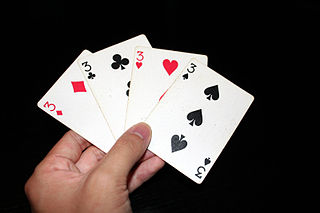
Gin Rummy, or simply Gin, is a two-player card game variant of Rummy. It has enjoyed widespread popularity as both a social and a gambling game, especially during the mid twentieth century, and remains today one of the most widely played two-player card games.
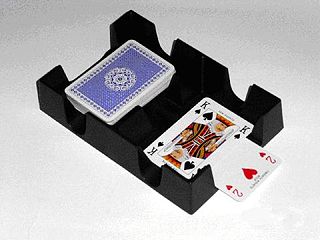
Canasta is a card game of the rummy family of games believed to be a variant of 500 rum. Although many variations exist for two, three, five or six players, it is most commonly played by four in two partnerships with two standard decks of cards. Players attempt to make melds of seven cards of the same rank and "go out" by playing all cards in their hands.

Uno, stylized as UNO, is a proprietary American shedding-type card game originally developed in 1971 by Merle Robbins in Reading, Ohio, a suburb of Cincinnati, that housed International Games Inc., a gaming company acquired by Mattel on January 23, 1992.

500 rum, also called pinochle rummy, Michigan rummy, Persian rummy, rummy 500 or 500 rummy, is a popular variant of rummy. The game of canasta and several other games are believed to have developed from this popular form of rummy. The distinctive feature of 500 rum is that each player scores the value of the sets or cards they meld. It may be played by 2 to 8 players, but it is best for 3 to 5.

Cheat is a card game where the players aim to get rid of all of their cards. It is a game of deception, with cards being played face-down and players being permitted to lie about the cards they have played. A challenge is usually made by players calling out the name of the game, and the loser of a challenge has to pick up every card played so far. Cheat is classed as a party game. As with many card games, cheat has an oral tradition and so people are taught the game under different names.
Literature is a card game for 6 or 8 players in two teams using a shortened version of the standard 52-card pack. The game is sometimes called Fish or Canadian Fish, after the similar Go Fish, or Russian Fish. It is played in Tamil Nadu and Kerala in southern India and in parts of North America.
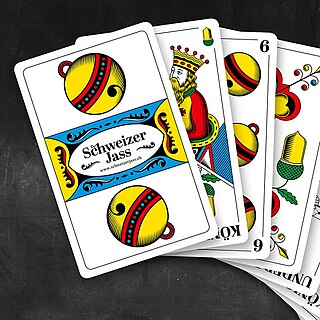
Jass is a family of trick taking, ace–ten card games and, in its key forms, a distinctive branch of the marriage family. It is popular in its native Switzerland as well as the rest of the Alemannic German-speaking area of Europe, Italian South Tyrol and in a few places in Wisconsin, Ohio, California, Oregon and Washington USA.
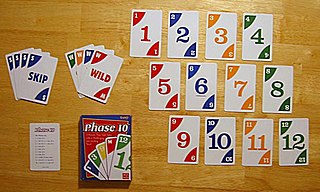
Phase 10 is a card game created in 1982 by Kenneth Johnson and sold by Mattel, which purchased the rights from Fundex Games in 2010. Phase 10 is based on a variant of rummy known as contract rummy. It consists of a special deck equivalent to two regular decks of cards, and can be played by two to six people. The game is named after the ten phases a player must advance through to win. Many people shorten the game by aligning it to baseball rules and consider 5.5 phases a complete game when running out of time to complete the full ten phases. Whoever is in the lead when play stops if someone has completed 5.5 phases or more is the winner.
Jaques of London, formerly known as John Jaques of London and Jaques and Son of London is a long-established family company that manufactures sports and game equipment.

Probe is a parlor game or board game introduced in the 1960s by Parker Brothers. It is reminiscent of the simple two-person game Hangman, whose object is to guess a word chosen by another player by revealing specific letters. Probe extends the number of players to a maximum of four and introduces additional game elements that increase the levels of both skill and chance. Like Hangman, each player has a secret chosen word. But unlike Hangman, the game ends when the last word, not the first word, is revealed. All players remain in the game until the end. It was created by Ted Leavitt and licensed by him to Parker Brothers.

Continental Rummy is a progressive partnership Rummy card game related to Rumino. It is considered the forerunner of the whole family of rummy games using two packs of cards as one. Its name derives from the fact that it is played throughout the continental Europe, the United States, Mexico, Canada, and also in South America. According to Albert Morehead, it was "at one time the most popular form of Rummy in women's afternoon games, until in 1950 it lost out to Canasta."

Kalooki or Kaluki is a card game popularly played in Jamaica. It is sometimes called Jamaican Rummy for similarities in structure the game bears with Contract Rummy or Gin Rummy. The games are, however, different and not to be confused.
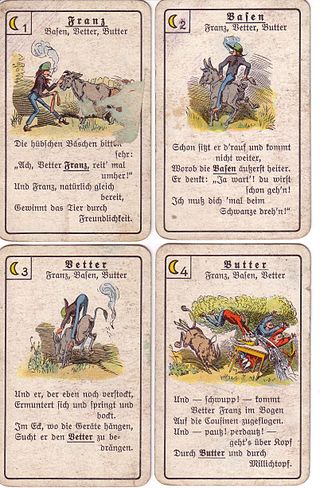
Quartets is a dedicated deck card game with the object to collect 4 cards in a series, similar to Go Fish and Happy Families.

Go Fish or Fish is a card game usually played by two to five players, although it can be played with up to 10 players. It can be played in about 5 to 15 minutes.

Schnapsen, Schnapser or Schnapsa is a trick-taking card game of the bézique (ace–ten) family that is very popular in Bavaria and in the territories of the former Austro-Hungarian Empire and has become the national card game of Austria and Hungary. Schnapsen is both of the point-trick and trick-and-draw subtypes.

Rams is a European trick-taking card game related to Nap and Loo, and may be played by any number of persons not exceeding nine, although five or seven make a good game. In Belgium and France, the game of Rams is also spelt Rammes or Rems, in Germany, Rams, Rammes, Ramsch, Ramschen, Ramscheln or Ramsen, in Austria, Ramsen and Ramschen, and, in America, Rounce. The basic idea is fairly constant, but scoring systems vary. It was a widespread European gambling and drinking game that is still popular today. During the 19th century, it was introduced as Rounce in America and played with a 52-card deck without any difference between simples and doubles and with no General Rounce announcement. In the modern German variety of the game, Ramscheln, the 7♦ is the second best trump ranking next below the ace.
Elfern or Elfmandeln, is a very old, German and Austrian 6-card, no-trump, trick-and-draw game for two players using a 32-card, French-suited Piquet pack or German-suited Skat pack. The object is to win the majority of the 20 honours: the Ace, King, Queen, Jack and Ten in a Piquet pack or the Ace, King, Ober, Unter and Ten in a Skat pack. Elfern is at least 250 years old and a possible ancestor to the Marriage family of card games, yet it is still played by German children.
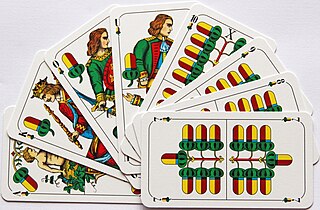
Wallachen is an Old Bavarian card game, which used to be very popular in eastern Bavaria. Although, by 2012, it had become a rarer sight at pub tables, there have been more recent moves to revive it. Wallachen is a relatively simple three-hander that is easy to learn. As a result, like Grasobern, it has a relatively relaxed character without the mental demands of Schafkopf or the psychological stress of Watten. It is a member of the Préférence family of card games.

Ramsen or Ramsch is a traditional Bavarian plain-trick, card game for three to five players that is played with a 32-card German-suited pack and is suitable both for adults and for children. It is one of the Rams group of card games that are distinguished by allowing players to drop out if they think they will fail to win the required number of tricks. An unusual feature of Ramsen is the presence of four permanent trump cards that rank just below the Trump Sow (Ace). It should not be confused with the contract of Ramsch in games like Skat or Schafkopf, nor with the related game of Rams which is also called Ramsenin Austria, but is played with a Piquet pack, does not have permanent trumps and has a different card ranking.

















